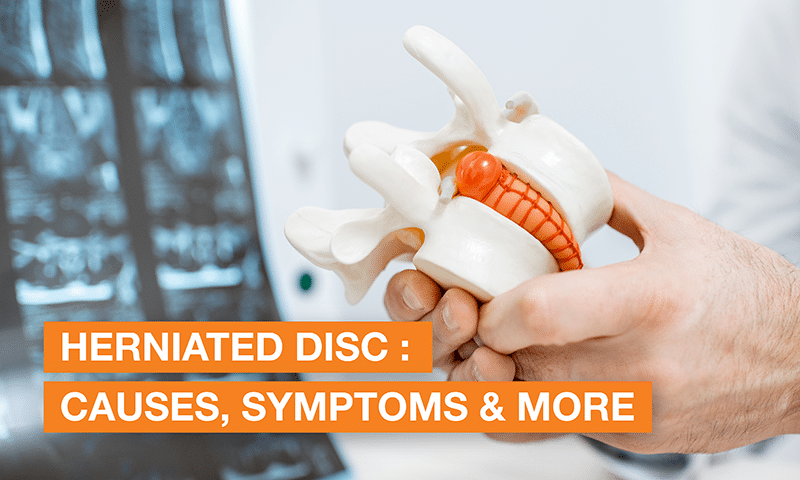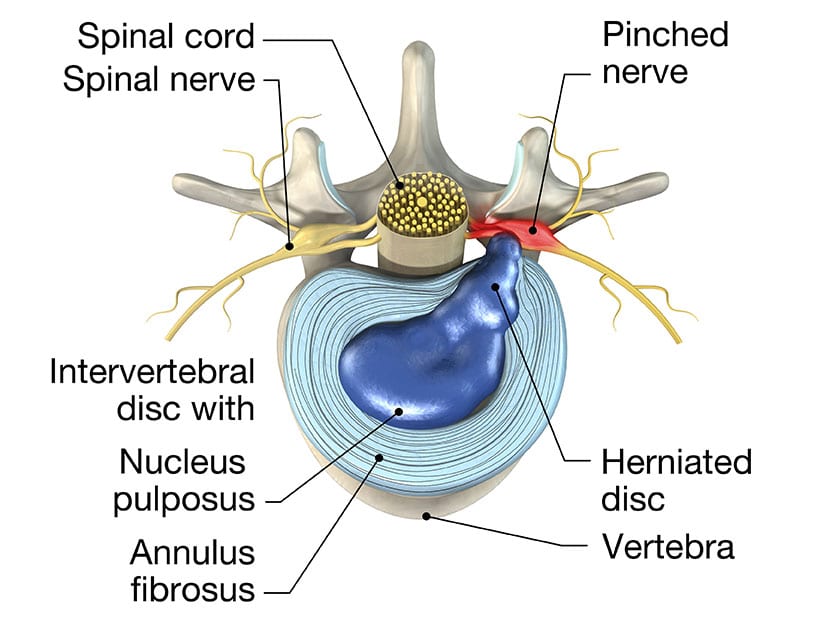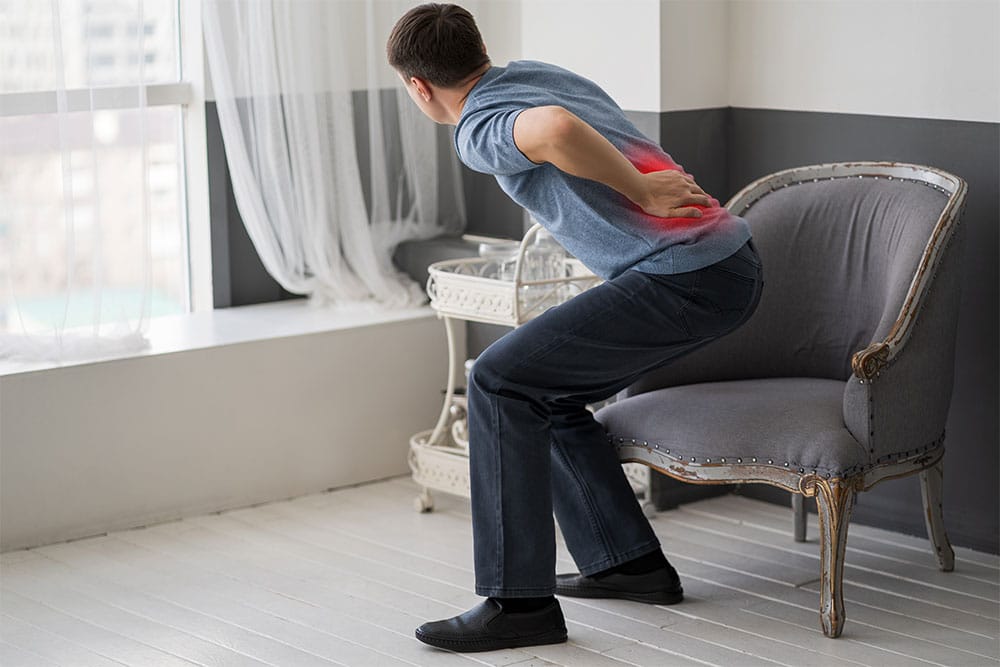Request Appointment
Enter your details and we will be in touch with you shortly;
Or call
8655885566
between 8 am and 8 pm.


If you are suffering from back pain for a long time, it is possible that the problem is much deeper than what appears to the eye. There are various spinal conditions that may just start as a pain in one part of your body. Herniated discs is a condition where vertebrae of the spinal cord are pressed against each other squeezing or forcing the disc to rupture. It is estimated that 5 to 20 cases of herniated discs are reported per 1000 adults, especially in the age group 30 to 50 years affecting twice the number of males than females.
Let’s recount what’s a herniated disc in brief along with its symptoms, causes, diagnosis, and non-surgical treatment among others.

Your spinal cord isn’t a single joint-less structure. It is a group of bones called vertebrae that are interconnected to each other with a cushion-like structure called discs in between. The vertebrae allow motion while protecting the spinal cord and nerves running through the spinal canal.
Talking about discs found in-between vertebrae, these are round in shape, made up of a soft jelly-like structure with a nucleus enclosed in a tough outer layer called an annulus. One of the major tasks of these discs is to absorb shocks helping the spinal bones to cope with them such as when sitting, standing, flexing, stretching, bending, etc.
The diagnosis for herniated discs and its extent is done by a healthcare professional. Your doctor will assess your current condition, check for reflexes, sensitivity to touch, muscle strength among others. They can ask you to undergo a series of exams such as MRI, CT, X-rays, EMG, Myelogram among others.
A herniated disc occurs when a fragment of the disc slips from its cavity, gets bulged, or ruptures where the nucleus is forced out of the annulus given the excessive pressure that the vertebrates in-question are going through. The spinal canal inside a spinal cord has very limited space. When a disc is herniated, the displaced disc fragment pinches on the spinal nerve resulting in bulge or rupture that leads to mild to severe back pain. The back pain could be localised or radiating throughout the body.
Herniated discs may happen during flexion such as when sitting for a prolonged duration and for a long time. As per experts, the pressure on these discs maybe 50% when sitting with a good posture and 100% when sitting with a bad posture adding to the situation. Herniated discs may occur in the cervical spine or the neck portion as well as the lower back (lumbar spine) where the latter is much more common.
As aforementioned, herniated discs occur when the jelly-like nucleus is forced out through ruptured fragments of the tough annulus in a disk between two vertebrae. It can occur gradually with wear and tear, especially among senior citizens. Other causes may include excessive weight, sudden strain on the back such as twisting or improper lifting, and repetitive motions. There’s also family history to keep in mind that can enhance one’s probability of developing herniated discs.

Herniated discs may seem like a general back pain but it may be degenerative. Thus, it is crucial to understand the symptoms that are tell-tale signs that you might need a doctor’s help before it stretches too far. When the inner section of a disk escapes from its original position, it releases chemicals that irritate nerves causing pain and inflammation in the surrounding areas.
There’s a sensation of tingling or numbness that occurs when the herniated disk pushes the nerves or the spinal cord and can travel up to your legs or arms. You might feel pain in your calf, thigh, or buttocks when the herniated disk is in the lower back, and may often lead to Sciatica. For those suffering from a herniated disk in the neck, they might feel pain in the arm and shoulder.
The pain can be severe and electric shock-like and may shoot up when you are sitting, walking, or standing. Other symptoms include weakness in the muscles affected, limiting your ability to lift any item or hold them. Of course, these are just some symptoms that can be precursors that you might have herniated discs. We recommend taking assistance from a professional to find the root cause and the treatment plans to proceed with.
The majority of people suffering from herniated disk symptoms will recover in up to 12 weeks without needing any external help. It is usually practised by steering clear of triggers that would otherwise enhance the pain. For others, there are some non-surgical treatments that unlock the freedom from that sharp back pain that can radiate throughout the body. Let’s take a count of some of the widely used non-surgical treatments for herniated discs.
Medications:Anti-inflammatory over-the-counter (OTC) medicines that can reduce back pain considerably such as Naproxen and Ibuprofen.
Medical Movements :Specialised medical movements are a great way to relieve the excessive pressure that nerves and the spinal cord may be facing. It minimises pain, improves blood circulation, and loosens tight muscles. It is the first line of action beyond which, the patient may be recommended other treatments
Injections:Another non-surgical method where the patient is administered epidural or spinal nerve block injections right into their spine. The steroid-laden medication helps subside inflammation and swelling giving the area around herniated disk a chance to heal itself rapidly.
Back pain is one of the common musculoskeletal conditions that people face nowadays. More than 80% of the people on the face of this planet will undergo back pain sometime in their lives. Herniated discs are one of the many back-related issues that have riddled people for years. If you are facing similar issues to no avail, reach out to QI Spine Clinic. It is India’s first non-invasive spine rehabilitation clinic that ensures freedom from back pain without surgeries. You can call us at 086558 85566 to know more.
Visit our nearest clinic for your first consultation